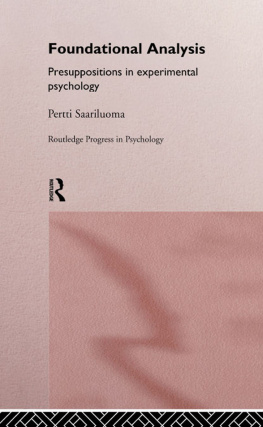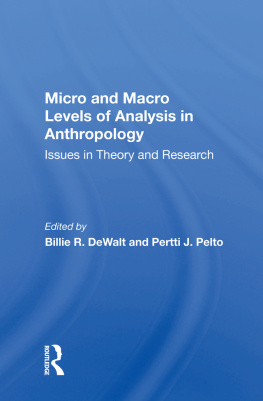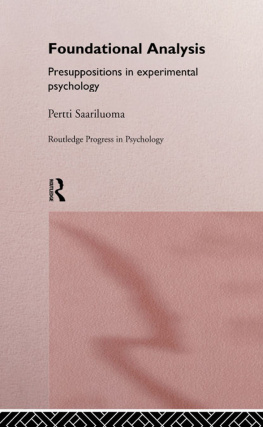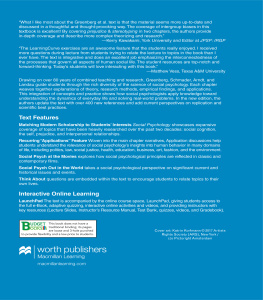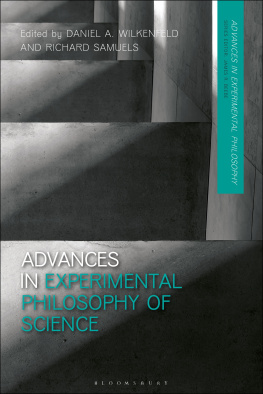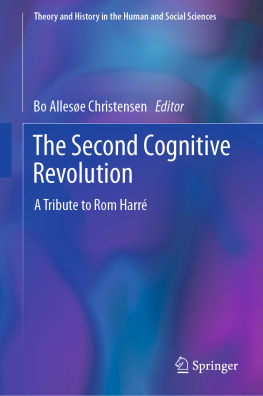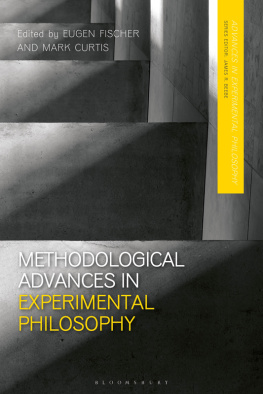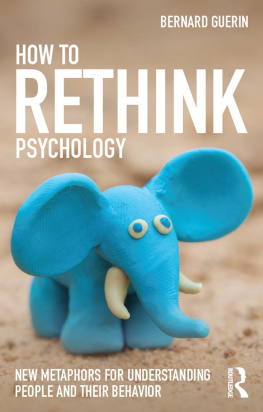
Foundational analysis
In a critical analysis of the assumptions underlying experimental psychology, Pertti Saariluoma urges social scientists to reflect upon their procedures and methodology. He has revisited the philosophy of science to find a new way of applying its methods to psychology. Foundational analysis shows how it is possible to analyse existing arguments and find loopholes in them and raises new issues for the rationale behind empirical technique. It will be of interest to researchers and students in cognitive science and other social sciences, and in the philosophy of science.
Pertti Saariluoma is Professor of Cognitive Science at the University of Helsinki. He has been a visitor at the universities of Oxford, Cambridge, Carnegie-Mellon and Aberdeen. His previous publications include Chess Players Thinking (1995).
Routledge Progress in Psychology
1 Emerging patterns of literacy
A multidisciplinary perspective
Rhian Jones
2 Foundational analysis
Presuppositions in experimental psychology
Pertti Saariluoma
Foundational analysis
Presuppositions in experimental psychology
Pertti Saariluoma

First published 1997
by Routledge
Published 2016 by Routledge
2 Park Square, Milton Park, Abingdon, Oxon OX14 4RN
Simultaneously published in the USA and Canada by Routledge
711 Third Avenue, New York, NY, 10017, USA
Routledge is an imprint of the Taylor & Francis Group, an infoma business
1997 Pertti Saariluoma
Phototypeset in Times by Intype London Ltd
All rights reserved. No part of this book may be reprinted or reproduced or utilized in any form or by any electronic, mechanical, or other means, now known or hereafter invented, including photocopying and recording, or in any information storage or retrieval system, without permission in writing from the publishers.
British Library Cataloguing in Publication Data
A catalogue record for this book is available from the British Library
Library of Congress Cataloging in Publication Data
A catalogue record for this book has been requested
ISBN 13: 978-0-415-14585-5 (hbk)
One cannot make experiments if there are not some things that one does not doubt. But that does not mean that one takes certain presuppositions on trust. If I make an experiment I do not doubt the existence of the apparatus before my eyes. I have plenty of doubts but not that.
Wittgenstein, On Certainty
Contents
Charles Sanders Peirce once suggested that a science of guiding principles should be established. Guiding principles were to him facts which we must already know before we can have any clear conception of reasoning at all. Unfortunately, such a science was never established. The reason for the rejection of the science of guiding principles was that the analysis of guiding principles did not actually belong to any specific field of science. The science of guiding principles was too specific for philosophers, because all sciences have different guiding principles, and too general for special scientists, because the foundations of science have seldom been seen regarded as essential prerequisites for making observations. Since, however, the problems of making observations, such as theory-ladenness, have now become obvious to all, it is time to go back to Peirces idea and also extend it by accepting that any fact may become a guiding principle.
This book intends to open a discussion on the analysis of guiding principles or hidden presuppositions in argumentative chains in psychology. This means that in a sense it aims at realizing Peirces idea, although the current realization is in many ways different from what Peirce had possibly envisioned. Current science and metascience are simply too different from the days of Peirce for any deeper connection to be built. In fact, Peirce never presented the idea except in two short notes. Nevertheless, I believe, as Peirce did, that the very reason for establishing a foundational analysis lies in its practicality and usefulness.
The most obvious difference between my position in this book and that of Peirce can be found in the locus of analysis. Whereas Peirce was searching for a special science of guiding principles, I think that the analysis of the foundations of psychology should form an essential part of a modern psychological research process. Instead of analysing the foundations outside a particular field of science such as psychology, the analysis should take place within the individual sciences. Hence, I shall argue that instead of a specific science one needs to establish a specific method in a specific research field.
In a sense this book is intended to provide psychologists with a method and philosophers with an explanation. The method presented in this book is meant to improve the validity of argumentation and innovativeness of research in psychology. This means, in essence, that by abandoning the classic metatheory of logical empiricism, which was rejected by philosophers decades ago, psychologists could work out new metatheoretical grounds for their work. The self-criticism and the creativity of psychology could be improved, and this would eventually lead to improvements in the quality of argumentation.
By providing philosophers with an explanation I am referring to the reasons why the influence of the new tenets in metascience, begun with Sellars attack on the myth of the given, Hansons analysis of observations and Kuhns study of advancement, has been modest in psychology. Metatheoretical discussion, in fact, has never found a fully accepted form within modern psychology. This has meant that metatheory has produced new metatheory rather than new psychology. I wish to point out a missing link in order to improve the connection, so that in the future the illuminative insights of the new metatheory become essential tools in psychological work. Ideally, the reconstruction of scientific progress would lead to a real improvement in the research process of psychological science.
To make things clearer I wished to investigate two examples of the problems which foundational analysis should be able to meet. Beck tells in the following passage how he ended up with his idea of automated thoughts, i.e. very rapid, practically involuntary dysfunctional thoughts in clinical patients:
All my patients had been instructed in the basic rule of free association (The patient is requested to say everything that enters his mind, without selection) and most learned quite well to overcome the tendency to censor their ideas. They express rather freely feelings, wishes, and experiences they had concealed from other people because of fear of disapproval. Although I recognized that my patients could not possibly report all their thoughts, I believed that their verbalizations represented a fairly good cross-section of their conscious ideation.
In time, however, I began to suspect that the patients were not reporting certain kinds of ideation. This omission was not due to any resistence or defensiveness on the part of the patient, but rather it had to do with the fact that the patient had not been trained to focus on certain kinds of thought. In retrospect, it is apparent to me that the types of ideation that had gone unnoticed are in fact crucial to understanding the nature of psychological problems. Although other psychoanalysts may have exposed this rich vein of material, they had not reported it as such in the literature.
Next page
